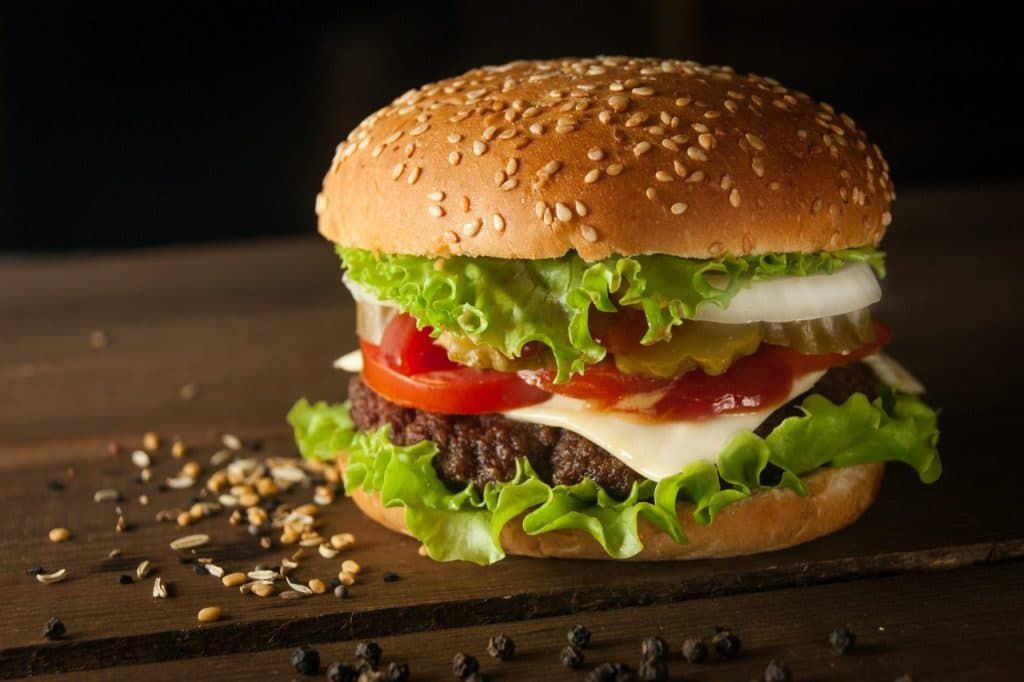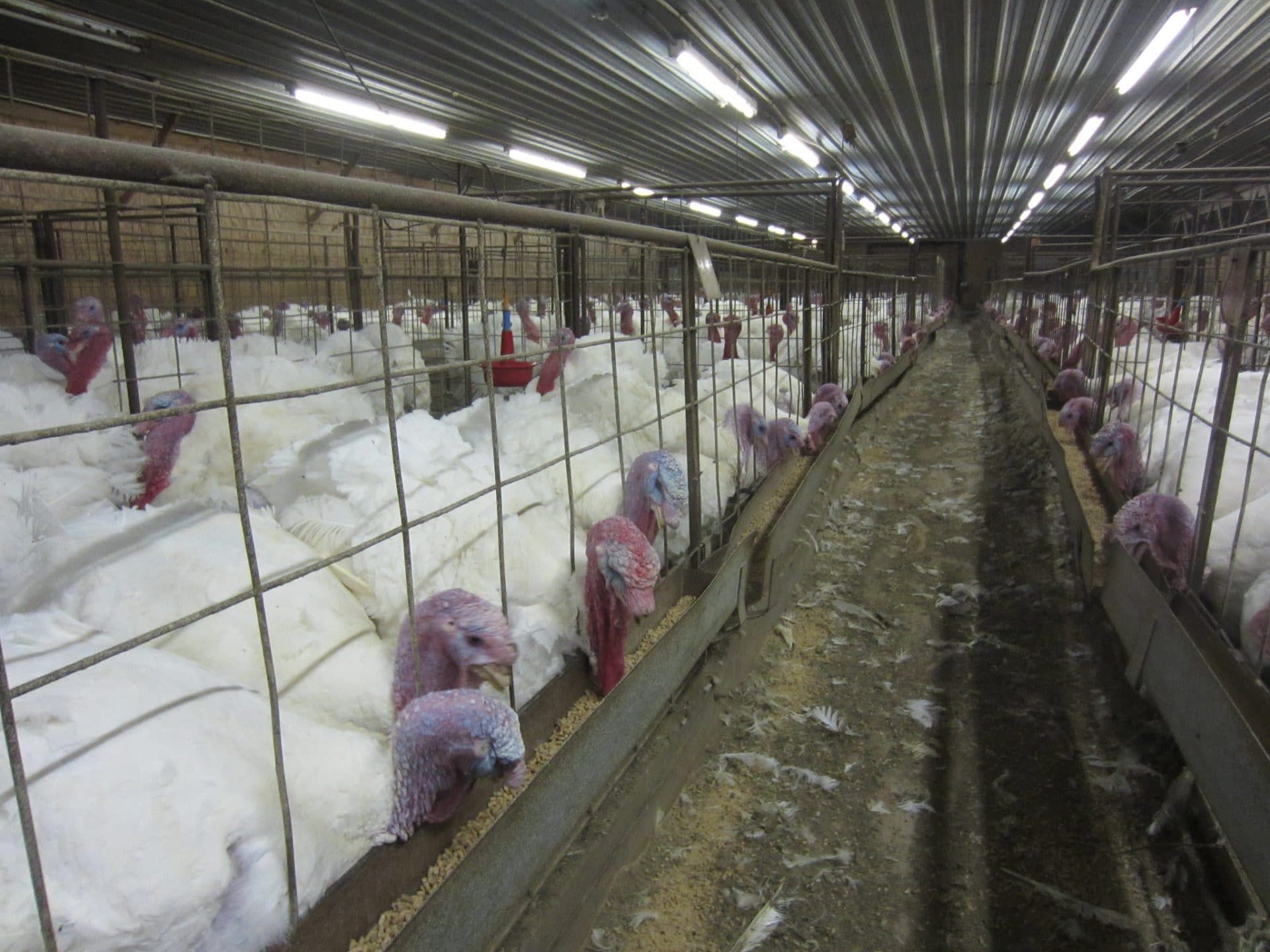Reinventing meat to stave off climate crisis—and the next pandemic
By Jessica McKenzie | March 25, 2022
 Photo by Ilya Mashkov on Unsplash
Photo by Ilya Mashkov on Unsplash
Are we eating our way into climate crisis?
The global food system is responsible for between 21 and 37 percent of annual emissions of greenhouse gases like carbon dioxide, methane, and nitrous oxide. Roughly half of the world’s land surface is used for agriculture, and 96 percent of the world’s mammalian biomass is either human or livestock, chiefly pigs and cattle. And the global appetite for meat is only predicted to grow.
Bruce Friedrich believes that there is a better way to make and eat meat. He founded the Good Food Institute to advance the future of alternative meats, including plant-based meat made from—duh—plants (like pea protein and coconut oil), and cultivated meats, which are grown from animal cells.
In this interview with Bulletin associate editor Jessica McKenzie, Friedrich elaborates on Good Food Institute’s theory of change, why it is working with—not against—meat companies, how alternative meats could help prevent the next pandemic, and how they can achieve taste, texture, and price parity with meat. He also responds to criticisms that alternative meats are nothing more than corporate greenwashing.
(Editor’s note: This interview has been condensed and edited for brevity and clarity.)
Jessica McKenzie: Could you briefly introduce the Good Food Institute—what you do and what your goals are, and how it was started?
Bruce Friedrich: We were founded because of the observation that the way industrial meat is produced has a variety of significant external costs, but consumers do not incorporate external costs into their buying decisions.
Per capita and gross meat consumption is going up and up and up. The United Nations says we’re going to have to produce 70 to 100 percent more meat by 2050. And there is not any plausible scenario wherein we don’t consume 70 to 100 percent more meat by 2050. Rather than trying to convince the world that what is inevitable shouldn’t happen, we are focused on eliminating or mitigating the external costs of the way that meat is produced. The way we think about this analogizes nicely to renewable energy and electric vehicles: The world is not going to consume less energy in 2050 than it does now. Countries, as they develop, consume more energy. But we can make that energy renewable. We’re not going to convince the world to ride bikes and walk everywhere. People will drive, but we can electrify transport. Similarly, people will eat more meat, but we can make that meat from plants, and we can cultivate that meat from cells with a fraction of the direct emissions, a fraction of the land-use requirements, no antibiotics required, and no pandemic risk.
So GFI is focused on making meat better. Our inspiration was companies like Impossible Foods and Beyond Meat—of making plant-based meat for meat eaters and competing with the meat industry. And also cultivated meat companies like Upside Foods, Mosa Meat, and so many others. With all those companies, the founders would have an idea, and then they’d have a company. The first thing GFI did was hire scientists and say, “Let’s figure out the technological readiness and open source what the world knows about making meat from plants and cultivating meat from cells.” The plurality of GFI’s team members around the world are still scientists. Our global battle cry is, just as governments fund and incentivize research and development around renewable energy and electrification of transport, government should be doing that for alternative proteins.
McKenzie: To what extent are you trying to level the playing field with meat companies? Do government subsidies for animal products make it harder to compete on cost? It seems like you’re more interested in research and development than making meat more expensive.
Friedrich: Yes, we focus on research and development, on lobbying governments to, for example, fund the Center for Excellence at Tufts that the USDA is putting $10 million into. And we focus on private sector incentives for R&D and private sector incentives for manufacturing and infrastructure scale up. We don’t do any of the punitive work at all. The one thing we do that is somewhat in that category is fighting against label censorship. We’ve sued three states so far with the ACLU for passing laws to make it illegal to call a veggie burger, a veggie burger. So, First Amendment lawsuits to allow for clear labels on plant-based meat that say, you know, this is plant-based meat.
We’re not trying to make meat more expensive. We’re not fighting against subsidies, in part, because every president of the United States since Ronald Reagan has—except maybe Donald Trump, tough to know—but Ronald Reagan, and both George Bushes, Bill Clinton, and Barack Obama—Obama campaigned on getting rid of agricultural subsidies. And agricultural subsidies have never gone down at all. There are, you know, hundreds or thousands of NGOs fighting against agricultural subsidies and making no progress at all. So what are tractable solutions? We think we can make huge progress with open access R&D, and huge progress with private sector incentives, but probably no progress beating our head against the subsidy wall.
McKenzie: But you do think it’s possible to eventually compete on both cost and similarity to meat?
Friedrich: Oh, absolutely.
McKenzie: Even if people aren’t paying the true cost of meat?
Friedrich: You know, it’s interesting. It’s a strong talking point, the idea that agricultural subsidies are depressing the price of meat, but they’re not depressing the price of meat that much. They’re big numbers, in terms of gross dollar terms, but spread across the amount of meat that Americans eat, it’s a couple cents per pound. There have been multiple analyses of the effect of subsidies on costs, and they oftentimes get conflated with the idea of incorporating the health and environmental costs of meat. Incorporating the health and environmental costs into the cost of meat would certainly increase the price. But there’s even less chance of that happening, at least in the United States, than getting rid of subsidies. But the subsidies are fairly inconsequential, in terms of the price of meat.
It takes nine calories of crops to get a calorie out in the form of chicken. So if you’re growing all of these crops and feeding them to animals, that’s a vastly inefficient system. If you take those crops and turn them into meat, that requires so many fewer resources. It is a huge boon from a land use, and direct emissions analysis, because it is so much more efficient. Which means as it scales up, it should certainly be possible to get to a point at which both plant-based meat and cultivated meat costs less than industrial animal meat, whether or not there’s a future world where external costs are incorporated into the price of the animal products, and with or without subsidies.
McKenzie: You’ve also said eating alternative meats requires no intentional behavioral change, but meat is an extremely potent cultural touchstone. Can you speak to how you’re trying to overcome that barrier to widespread adoption?
Friedrich: We’re not trying to overcome that barrier. Just like this is a phone, even though it doesn’t have a cord. And this is a camera, even though it doesn’t require analog film. And people for however long thought phones needed to have cords and cameras needed to have film, and now they don’t. The idea is to give consumers something that is indistinguishable from the consumer standpoint to the products that they’re used to. So initially, that’s things like fish sticks, and hamburgers, and chicken nuggets and chicken breasts and those sorts of things. Eventually, it’s everything. And the idea is, from the vantage of the consumer, you are getting something that is indistinguishable: You’re not paying more for it, and you’re not sacrificing on taste and you’re not sacrificing on, you know, this is a comfort food. It’s just a different way of producing the exact same product that people are used to. Except it doesn’t require antibiotics, it doesn’t contribute to pandemic risk, it has a fraction of the direct emissions, it requires a fraction of the land. It costs less. It’s really not about convincing people that they should change how they think about food at all.

It’s like renewable energy, right? You’re not convincing people, you shouldn’t drive a car. You’re not convincing people, you shouldn’t heat your house or watch a big screen TV. You’re just powering things differently. This is the same concept. You’re producing meat differently and better.
McKenzie: But that is not currently the case. I mean, some people say that they can’t tell the difference for some products. But right now, it is both more expensive, and not quite the same to eat many of these products.
Friedrich: I think the only one that’s there is the Impossible Burger. And even some connoisseurs can tell the difference. But this is why it requires government investment. We’re early days. We’re not there with solar panels or electric vehicles yet either. Lots of people are not buying electric cars yet, because you can’t do a cross country trip comfortably. A lot of people have not switched to solar, because it’s not yet super easy and cheap to just choose solar. The same thing with plant-based and cultivated meat. I mean, cultivated meat doesn’t exist commercially anywhere other than Singapore, and it’s a lot more expensive. The only plant-based product that has nailed taste comparison so far is the Impossible Burger. And that costs I think like 80 percent more in the grocery store. But we don’t meet our Paris obligations unless we solve this problem. The same way governments are incentivizing renewable energy and electric vehicles, governments need to incentivize alternative proteins.
McKenzie: So what do you need to achieve deep significant systemic change in order to level the playing field between alternative meats and everything else?
Friedrich: We need to scale it out. There are a whole bunch of different things that need to happen. We’ve seen with Beyond Meat’s current supply chain woes that this is different than a phone app. This is food. And there are lots of supply chain issues that go into food.
McKenzie: Can you elaborate a bit on what’s going on with Beyond Meat?
Friedrich: They’ve been having production and supply chain issues around basically producing as much product as people want to buy, which is causing some frustrations. Impossible Foods had the same thing happened to them. GFI just produced a report, where we said if plant-based meat is going to grow to 6 percent by 2030, this is what needs to happen in terms of the amount of protein isolate, the amount of coconut oil; we also produced a techno-economic analysis, looking at cultivated meat, and what needs to happen in terms of albumin production, what needs to happen in terms of the factories.
This is why we need more of what’s happening with National Science Foundation and USDA funding of original research on university campuses. We also need government helping private industry. Tesla exists because of a $450 million guaranteed loan from the Department of Energy. The US government and other governments need to be helping the private sector to be successful in producing plant-based and cultivated meat. They’ve got a leg up just in terms of efficiency. If one product requires nine times the input of another product, which is chicken, or 40 times the inputs of another product, which is beef, plant-based beef is far more efficient. But it still is different ingredients from the system that has been feeding the world for 100 years, so it’s going to require different manufacturing plants. In the case of cultivated meat, it’s going to require different bioreactors, it’s going to require, in both cases, raw material, the media to grow the cultivated meat, or the coconut oil to make sure that the plant-based meat does a maximally effective job of bio-mimicking the precise meat experience. There’s a lot that needs to happen. And that’s why we need scientists. And that’s why we need the really big food and meat corporations that are used to supplying millions and millions of consumers and meeting consumer demand. But we also need governments saying yes, this is a priority for us. And it should be a priority across global health and environmental concerns.
The Paris Agreement is probably not possible without alternative proteins, which means that government should be incentivizing alternative proteins. But it also is critically important to ensure that antibiotic resistance doesn’t eliminate modern medicine. The former head of the World Health Organization, Dr. Margaret Chan, said on our current antibiotic resistance trajectory, we’re on a fast track to modern medicine not existing. More than 70 percent of antibiotics produced by pharmaceuticals are fed to farm animals. With plant-based and cultivated meat that goes to zero. The UN Environment Program in July 2020 listed the seven most likely causes of the next pandemic. The first one was increased meat production. And the second one was factory farming. More animals means a greater likelihood of zoonotic disease, and the more you have genetically similar animals crammed into tight, filthy conditions, the more you are depressing their immune systems and basically begging for another COVID-19. But the next one could be significantly more transmissible; it could be significantly more deadly.

As a part of pandemic prevention programs, as a part of antibiotic resistance mitigation programs, and as a part of our Paris Agreement obligations, government should be helping to usher in as quickly as possible a shift from industrial animal meat production. We’ve been making meat the same way for 12,000 years. It’s an antiquated technology. And it’s time to give consumers that same meat experience we’re biologically programmed to want and crave, but we now have the food technology know-how to do that with plants, and to do that with cultivation.
McKenzie: Can you say a bit more about why you’re choosing to work with meat companies, when these corporations don’t necessarily have a great environmental track record?
Friedrich: The affirmative answer is they have massive supply chains. They have the understanding, the capacity, the know-how to do this, they have been providing meat to people extraordinarily successfully for decades, and so they can probably more efficiently get us to plant-based meat and cultivated meat than folks who are starting from zero. And then also if they see this as opportunity, rather than seeing this as threat, if they are benefiting from the science that governments are funding, if they are benefiting from the private sector incentives, they will either support those programs, or at the very least they won’t use their massive lobbying capacity to fight this transition.
It’s been encouraging to see JBS, which is the largest meat company in the world, producing some spectacularly good plant-based products and investing $100 million in cultivated meat. Same goes for Tyson and Cargill, the number two and number three meat companies in the world, Smithfield, BRF, number four, and number five. They want to sell protein profitably, that’s their business model. It is a headache for them, the external costs. They’re all looking at, how can they become more sustainable and better corporate citizens without sacrificing profits? This is a way for them to do that.
McKenzie: How does this compare to what we see with organic products, where companies produce both conventional and organic produce, for example. And they try to make money on that that premium label but are not necessarily as committed to the environmental practices that the original organic movement wanted? Are you worried about something like that happening?
Friedrich: Organic is a premium product. The production of organic is going to cost more, because it requires more from farmers. The dividends of plant-based meat and cultivated meat from an environmental standpoint come from the efficiency; by definition, the more efficient you are, the better the production practices are for the climate, which means you get those benefits.
And then again, the UK Government said antibiotic resistance is a more certain threat to the human race than climate change. Making plant-based meat and cultivated meat, you just are not using antibiotics. And pandemic risk goes to zero. If you think about what antibiotic resistance and pandemic risk and biodiversity loss and climate change do to the global poor, in particular, it’s pretty much tautological, the idea that the people who did the least to contribute to climate change are the ones who are most in jeopardy because of it. The same sort of thing is true with antibiotic resistance. A lot more people die in developed economies if medicine stops working, but it’s catastrophic—cataclysmic—in developing economies. Similarly, COVID-19, which was not a particularly bad pandemic, relative to what it could have been, sent another 150 million people into extreme poverty, all in developing economies.
If the meat industry as it exists today shifts to plant-based meat and cultivated meat, that doesn’t solve some of the problems of the food system for sure. But it does solve food’s contribution to pandemic risk and antibiotic resistance, it does slash the amount of land that’s required for food production, it does slash direct emissions contributions. So it’s a pretty colossal step in the right direction.
McKenzie: Some have pointed out that alternative meats are highly processed products that, like most animal agriculture, rely on monocultures, and they’re still more greenhouse gas intensive than other vegan proteins like tofu. How would you respond to those who say this is corporate greenwashing?
Friedrich: The uber-response to that, is that yes, this is not a silver bullet, and it doesn’t solve every problem of production agriculture. But it solves some pretty flippin’ big ones. Diet for a Small Planet came out 51 years ago now, and it argued basically for an unprocessed, non-monoculture, diversified system of, you know, tofu consumption. And since it came out, per capita meat consumption is probably up 200, 300 percent. More than that globally. Even in developed economies, it’s up just astronomically in the 51 years since that book came out. I mean, that’s the book that turned me vegan 34 years ago. But people more than made up for the meat I stopped eating.
Alternative proteins do not harm the efforts against processing, against monocultures, or the corporate hierarchy. As for eating tofu and tempeh and beans and rice, people can continue to do those things. Even as meat production shifts to being plant-based and cultivated meat, those two things can happen at the same time. It feels to me like a bizarre direction of activist effort to oppose something that is, you know, it’s working within the current system, but it’s making current products way less bad, even if it’s not addressing these other issues.
When people talk about processed foods and you look at the peer-reviewed research on why processed food is bad, all of them, 100 percent of those studies, it has to do with adding sugar, or adding fat, or taking out fiber. And when you look at plant-based meat and you compare it to what it’s replacing: it has more fiber, because animal meat has none. It has no cholesterol. It has some complex carbohydrates; it still has no sugar. It is a significantly better product from a processing standpoint. It requires a fraction of the monocultures—even if plant-based meat comes from monoculture soy in Iowa, it takes nine calories of monoculture soy to get a calorie of chicken; 40 calories of monoculture soy to get a calorie of beef. So it’s still huge mitigation. And yeah, it doesn’t challenge the existing corporate hierarchy, but it doesn’t entrench the existing corporate hierarchy. And it is not as good as tofu. But the idea is that people will eat this instead of meat, not instead of tofu.
McKenzie: I first heard those criticisms coming from a leftist, vegan space but recently in conversations with meat-eaters have heard those same ideas regurgitated, like, “if I don’t want to eat meat, I would just eat some lentils.” And this is coming from people who eat meat all the time. So it’s been interesting to see those talking points against alternative meats gain traction among meat-eaters.
Friedrich: If you look at what people are buying, and eating, even at Whole Foods, let alone at Target or Walmart, most people are not having big discussions about processed food. I don’t remember what the percentages of people who eat fast food on a weekly basis, but it’s huge, or the people who consume soda on a daily basis, but it’s huge. So I do think those of us who work in food policy, we oftentimes have a sense that is not accurate of what the general public is thinking where food is concerned.
We did a poll for some of our policy work recently, maybe a year ago now, so right on the back of all of the publicity around workers in slaughterhouses coming down with COVID. And being, you know, forced to work and not getting bathroom breaks and stuff. And in this national poll that we did, just 1 percent of people have qualms about the chicken industry. While the New York Times is like beating this drum about how exploitative of human beings the chicken industry is.
I think at the end of the day, if the companies can hit price and taste metrics, they will be quite successful. And if they can’t hit price and taste metrics, they will remain super niche. But we’re optimistic about them meeting price and taste metrics, because the basic science is in favor of that being able to happen.
Together, we make the world safer.
The Bulletin elevates expert voices above the noise. But as an independent nonprofit organization, our operations depend on the support of readers like you. Help us continue to deliver quality journalism that holds leaders accountable. Your support of our work at any level is important. In return, we promise our coverage will be understandable, influential, vigilant, solution-oriented, and fair-minded. Together we can make a difference.
Keywords: Cultured meat, Interview, agriculture, alternative meats, climate crisis, food production, greenhouse gas emissions, meat, plant-based meat
Topics: Biosecurity, Climate Change















